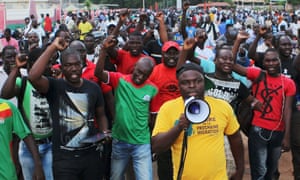Curfew declared as statement on national TV and radio says transitional government has been dissolved and interim president is no longer in power

Protesters stage a rally against the presidential guard in the Burkina Faso capital.
Photograph: Reuters
Murithi Mutiga (*) in Nairobi, and agencies in Ouagadougou
The military in Burkina Faso has declared that it controls the country, confirming that a coup has taken place just weeks before elections.
The announcement, aired on national television and radio, said the transitional government was dissolved and the interim president was no longer in power.
A curfew was declared and borders were closed. Heavy gunfire was heard in the main square of the capital, Ouagadougou, on Thursday morning after protesters poured into the streets to denounce the actions of the coup leaders, who are members of the elite presidential guard unit.
The elite guard, who had disagreed publicly with the transitional government in recent months, identified themselves as the National Council for Democracy and said they had taken control from a “deviant regime”.
The fate of the interim president, Michel Kafando, and the prime minister, Isaac Zida, who were both arrested after troops stormed into a cabinet meeting, was unclear.
Interim parliament speaker, Cheriff Sy, urged the masses to immediately rise up to protest against what he told Radio France International was clearly a coup.
The latest unrest comes just under a year after a much-praised popular uprising swept the old regime of long-serving leader Blaise Compaoré from power. Compaoré’s determined attempt to extend his 27-year rule was met with a mass revolt of rare vehemence by regional standards.
Protesters gathered in the streets in large numbers through October 2014 and set the parliamentary building on fire, forcing Compaoré to flee into exile in neighbouring Côte d’Ivoire.
The former president retained the loyalty of elements within the military, however, and electoral laws barring politicians who had supported electoral reforms to extend Compaoré’s stay in office from running in elections due on 11 October seemed to have provided the coup-plotters with an excuse to act.
Advertisement
In his address, Bamba announced the beginning of a “coherent, fair and equitable process” that would lead to inclusive elections.
But in an echo of the protests which ended Compaoré’s time in office, crowds gathered with whistles and vuvuzelas near the presidential palace on Thursday morning, shouting “Down with the RSP [presidential guard]”.
The headquarters of Compaoré’s Congress for Democracy and Progress party was ransacked in the evening.
Sy called the detention of the president and prime minister “a serious attack on the republic”. He said: “I call on all patriots to mobilise to defend the motherland. Duty calls us because the Burkinabe nation is in danger. We call on the solidarity that active forces, political forces, civil society and the international community have with all the people of Burkina Faso to defeat this operation.”
The military power-grab drew swift condemnation from many quarters. “The United States strongly condemns any attempt to seize power through extra-constitutional means or resolve internal political disagreements using force,” said US State Department spokesman John Kirby.
The UN secretary general, Ban Ki-moon, also expressed dismay after the presidential guard burst into a cabinet meeting. It comes less than a month before an election to complete a transition back to democracy after a popular uprising toppled Burkina Faso’s long-time ruler last year.
“The secretary general is outraged by reports of the detention of President Michel Kafando and prime minister Yacouba Isaac Zida of Burkina Faso,” Ban’s press office said in a statement. “The secretary general calls for their immediate release. This incident is a flagrant violation of Burkina Faso’s constitution and transitional charter.”
Advertisement
In a joint statement, the United Nations, African Union and the Economic Community of West African States (Ecowas) demanded “the immediate and unconditional release of the hostages”.
The UN security council also condemned in the strongest terms the detentions and demanded the immediate release of all government officials.
“The members of the security council urged all actors in Burkina Faso to refrain from any violence,” the 15-nation council said in the statement, which diplomats said was drafted by France.
The turmoil in the west African country reflects the unease and instability which has been triggered by the desire of long-serving, often autocratic leaders in many parts of sub-Saharan Africa to change the law to drop term limits.
The tiny central African country of Burundi is locked in a power struggle between President Pierre Nkurunziza and opponents resisting his efforts to serve out a third term.
On Wednesday, the Democratic Republic of the Congo president, Joseph Kabila, sacked two party leaders who had openly opposed his undeclared bid for a new term in office.
Similar efforts are under way in Rwanda and Congo, drawing condemnation from critics who say they may reverse the democratic strides witnessed on the continent in the last two decades.
(*) Murithi Mutiga is a journalist based in Nairobi, and has covered the conflicts in the Great Lakes region of Africa for a decade.

Click:
Nine of the most controversial leaders in Africa
Δεν υπάρχουν σχόλια:
Δημοσίευση σχολίου